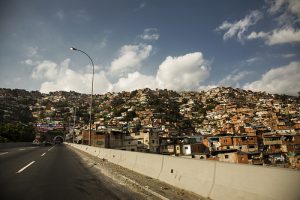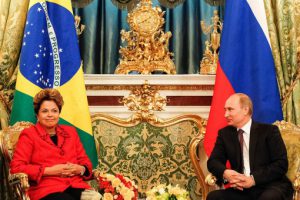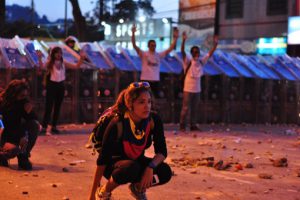
AQ Slideshow: Venezuela’s Colectivos
Caracas has been the scenario of violent clashes between Venezuelan President Nicolás Maduro’s government forces and opposition groups, led mainly by opposition politician Leopoldo López, since February 12. So far, the conflict has left at least 41 people dead, and armed chavista groups—nicknamed “colectivos”—have been blamed for many of the casualties. However, members of the … Read more
Maduro Faces Conundrum as UNASUR Starts Peace Talks
A delegation of foreign ministers from the Union of South American Nations (UNASUR) returned to Caracas on April 7 and 8, securing an agreement to hold peace talks to calm political polarization and protests in Venezuela. The talks are being mediated by the foreign ministers of Colombia, Brazil and Ecuador, plus a Vatican representative. The … Read more
Colombia’s Economic Success Story
Upcoming presidential elections and ongoing peace negotiations demonstrate Colombia’s consolidation of rule and law and democracy. President Juan Manuel Santos is seeking re-election, and free and fair elections have been a mainstay in the country since 1957—one of the longest stretches in Latin America. Moreover, the peace process, underway since October 2012, is a notable … Read more
Venezuelan Government, Opposition Agree to Talks
After weeks of unrest, the Venezuelan government and the Mesa de la Unidad Democrática (Democratic Unity Roundtable—MUD) opposition coalition agreed on Tuesday to “formal talks” to end the anti-government protests. The two sides have tentatively planned to meet on Thursday for a discussion mediated by the Vatican and the Unión de Naciones Suramericanas (Union of … Read more
Monday Memo: Costa Rican Elections – U.S. Deportations – Venezuela-Spain Spat – FIFA Delays
Unchallenged Costa Rican Candidate Wins Presidency: Luis Guillermo Solís of the Partido Acción Ciudadana (Citizen Action Party—PAC) won Sunday’s presidential election in Costa Rica, claiming 78 percent of the vote. The challenging candidate, Johnny Araya of the Partido Liberación Nacional (National Liberation Party—PLN), dropped out of the running after a March 5 opinion poll ranked … Read more
Colombian Oil: Scraping the Bottom of the Barrel
With production rates continuing at their current level Colombia will run out of oil within 6.9 years unless new, major oil fields are found. As of 2013, the country had 2.3 billion barrels of proven crude oil reserves, ranking fifth after Venezuela, Brazil, Ecuador, and Argentina in total reserves in South America. Most of these reserves … Read more

The Ukrainian Crisis and Latin America
Dynamics within the Ukraine are forcing reconsideration of an old concept in international politics–the sphere of influence. Russian President Vladimir Putin has not hesitated in saying that Russia has interests in the Ukraine, reserving the right to use force. Some Latin American governments have spoken out against the dismissal of former Ukrainian President Viktor Yanukovych … Read more
El viacrucis de Bogotá
Con Rafael Pardo como alcalde interino, el ex-alcalde Gustavo Petro destituido y en campaña por una Asamblea Constituyente, y unas elecciones atípicas en ciernes pero sin fecha definida, Bogotá—la ciudad más importante de Colombia—padece un viacrucis como consecuencia de una serie de malas decisiones administrativas, políticas y de abuso de poder nunca antes vistas. El … Read more
Monday Memo: Investment in Cuba – Venezuela – Costa Rican Elections – Rio Police – Mining in Peru
Cuba Approves New Foreign Investment Law: The Cuban government on Saturday unanimously approved a law that provides new incentives for foreign investment in the island. The law will reduce taxes on profits from 30 to 15 percent in most areas, will speed up the approval process for foreign investment, and will exempt new investors from … Read more
Gasping for a Solution to Bogotá’s Air Pollution Problem
In December 2013, Bogotá’s Secretaría Distrital de Movilidad (District Mobility Secretariat) reported that there were 1,447,335 private vehicles registered in the city, representing a 76 percent increase in vehicles in only seven years. Yet the number of vehicles operating in the public service is predicted to decline from 18,482 in 2007 to just 12,333 in … Read more
Negotiations with Peruvian Informal Miners Continue
After six days of mining protests the Peruvian government finally announced an agreement with mining representatives on Tuesday, only to have it turned down by protesters. Over the past week over 20,000 unlicensed gold miners in Arequipa and Lima protested through marches, road blocks and sit-ins, denouncing a 2012 regulation that would require informal miners … Read more

Can Venezuela’s Economic Strategy Keep Protests From Spreading?
As protests continue in Venezuela, the government of President Nicolás Maduro has sought to delegitimize protests and isolate them in middle-class areas in the hope that they will burn out. The president’s rhetoric aims at inciting poorer citizens against student and middle-class protesters, who he blames for food shortages, and soaring inflation and by “sabotaging … Read more
Monday Memo: Chilean Protests – Rio Violence – Guantánamo – Venezuela Protests – Buenaventura, Colombia
Likely top stories this week: Chileans protest in Santiago; Brazil sends the military into Rio’s favelas; Uruguay will receive five Guantánamo prisoners; Venezuela will investigate abuses during protests; Colombia sends troops to Buenaventura. Chilean Protests: Newly-elected Chilean President Michelle Bachelet faced the first major protest of her new administration on Saturday, which was organized to … Read more
FARC Says Petro’s Removal Will Affect Peace Process
The Fuerzas Armadas Revolucionarias de Colombia (Revolutionary Armed Forces of Colombia—FARC) condemned the removal of leftist Mayor of Bogotá Gustavo Petro from office Thursday, saying it will have a negative impact on the peace negotiations. Last December, Petro, a former member of the demobilized guerrilla group Movimiento 19 de Abril (19th of April Movement—M-19), was … Read more
Monday Memo: El Salvador’s Next President – Venezuela – Peace in Colombia – Protesters Cross U.S.-Mexico Border – Bogotá and Petro
Likely top stories this week: election results are sustained in El Salvador; Venezuelan protests continue; Santos is optimistic about peace with FARC; young immigrant protesters cross back into the U.S.; Gustavo Petro’s future as mayor is uncertain in Bogotá. Cerén Declared Next President of El Salvador: El Salvador’s Supreme Electoral Tribunal officially rejected presidential candidate … Read more


